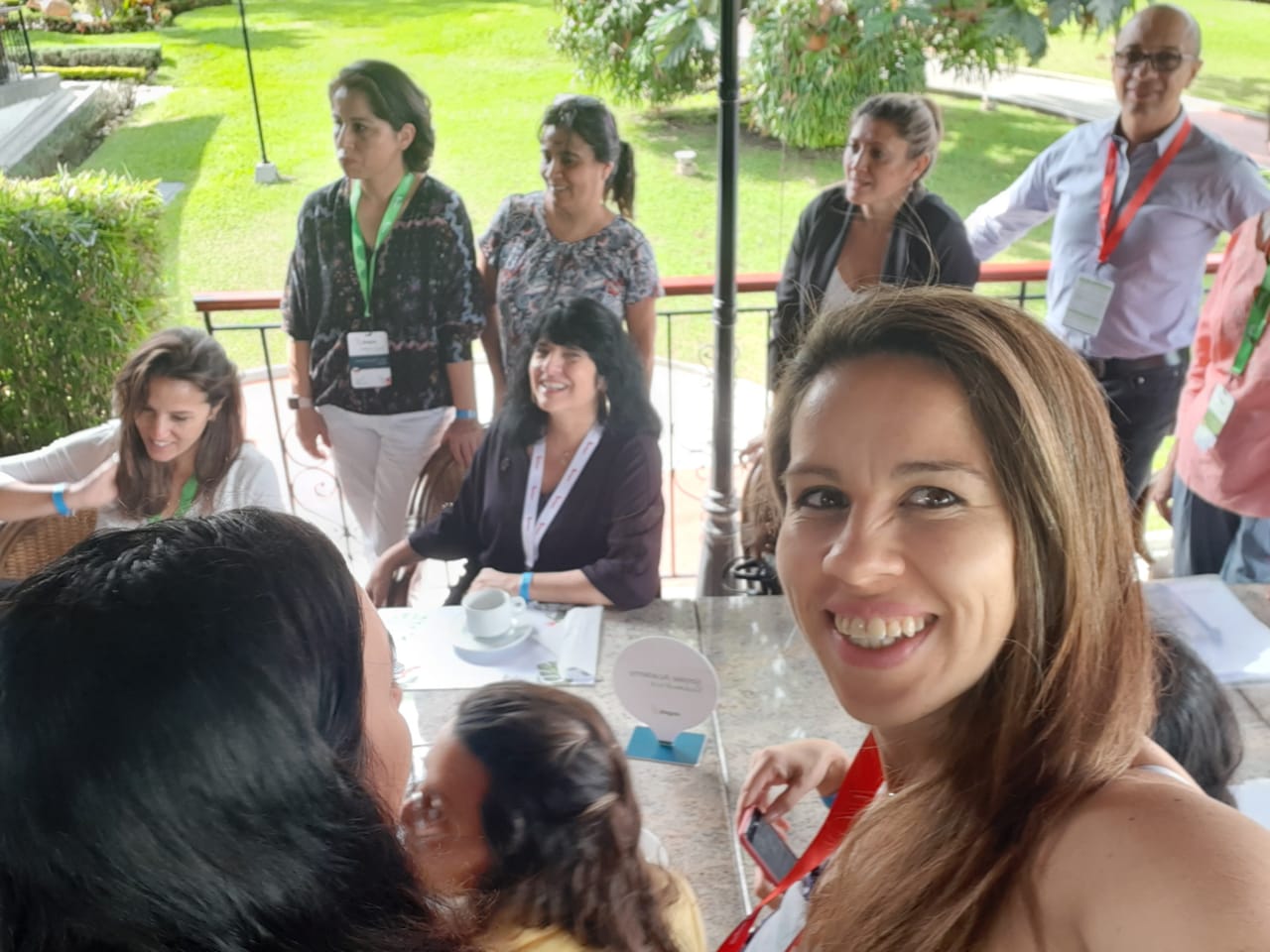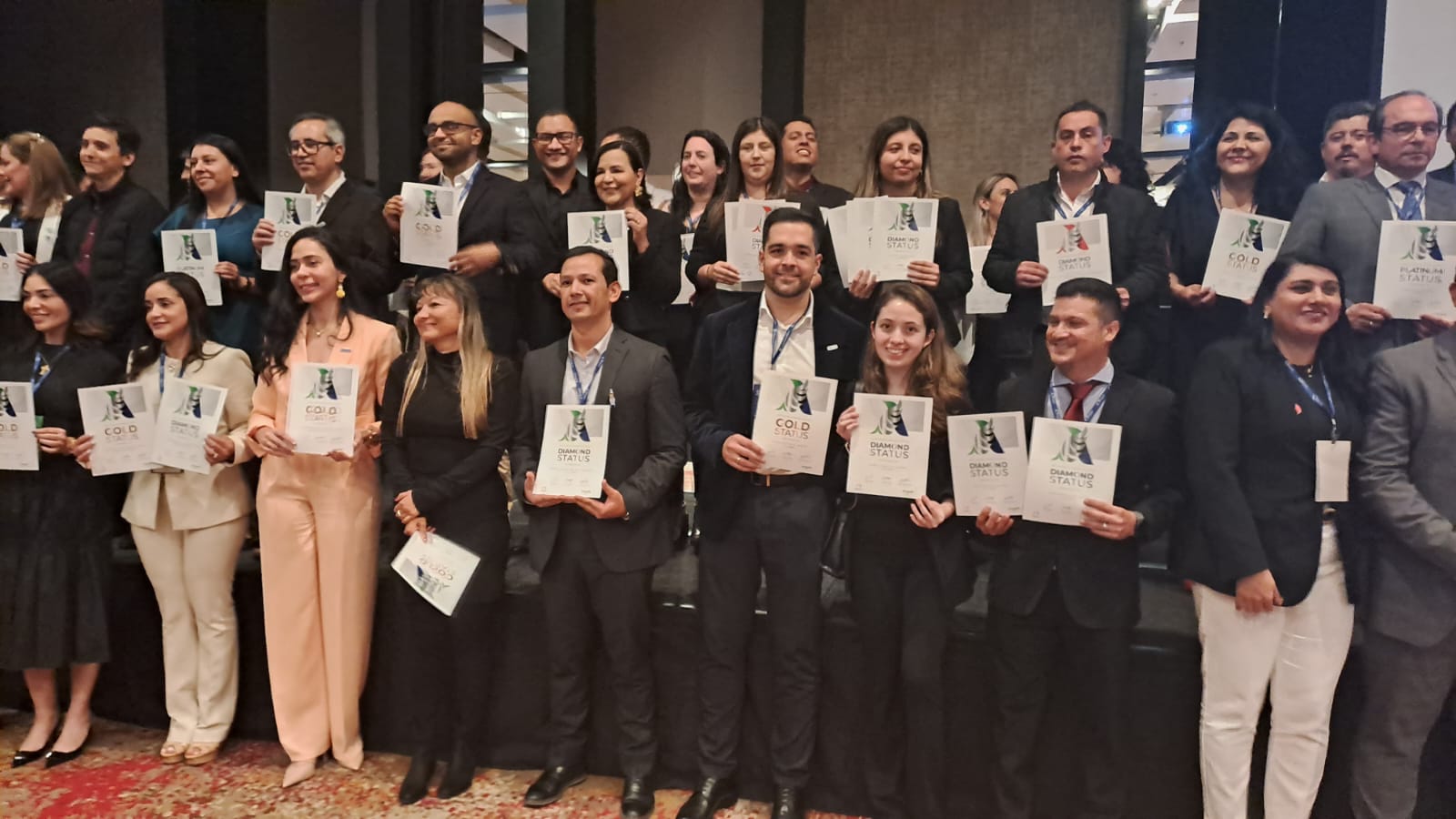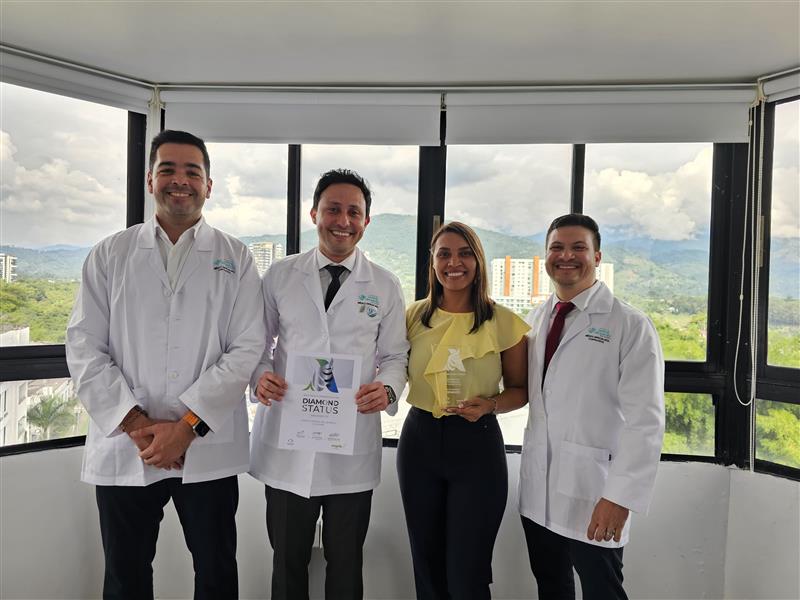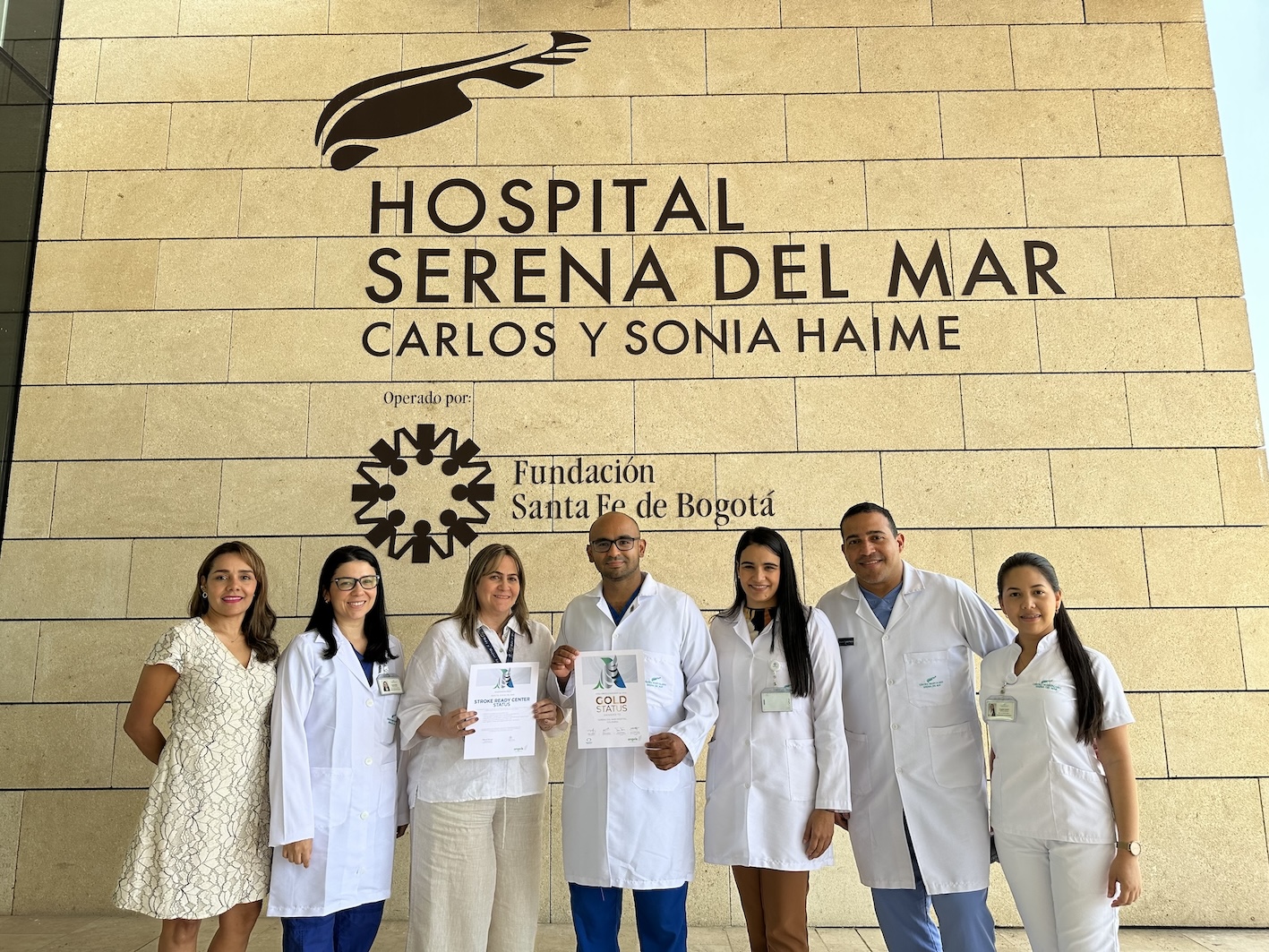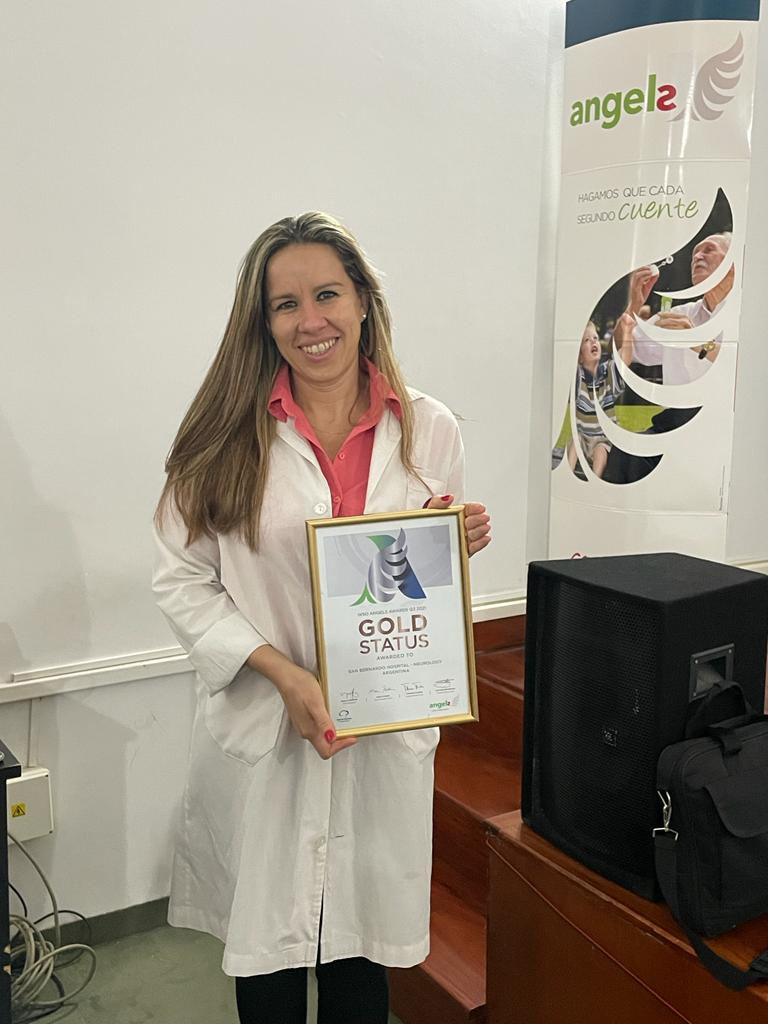
Un riconoscimenti d'oro ti porta al lavoro che svolgi da un decennio. Una volta raggiunto lo stato di platino, si riceve una stroke unit. La certificazione WSO apre la porta alla trombectomia. Vincere un riconoscimenti per la ricerca? Ora è possibile acquistare le attrezzature necessarie per continuare la ricerca.
Questa è la storia recente della cura dell'ictus presso l'Ospedale San Bernardo nella provincia argentina di Salta, dove la pazienza e la determinazione della Dott.ssa Gabriela Orzuza vengono finalmente premiate con ciò che ha desiderato da tempo – l'opportunità di fornire la migliore assistenza possibile ai pazienti colpiti da ictus.
La anamnesi vera richiede un po’ di più per raccontarla. Ritorna nella stessa città dell’Argentina nord-occidentale, dove Gabriela, tre anni, conosce il dott. Federico Núñez Burgos, un cardiologo che tiene un bacio in un barattolo nella sua consulenza. Gli insetti triatominici, per dare loro il nome corretto, sono insetti vettoriali responsabili della trasmissione della malattia di Chagas, una malattia parassitaria tropicale che causa cardiopatia in quasi la metà di coloro che sono infetti. Il cardiologo, che è il patrigno di Gabi, è anche uno studente di Chagas, di cui diremo di più tra un po'.
Con i genitori disposti a fare sacrifici per l'istruzione, Gabi frequenta le migliori scuole di Salsa prima di essere ricoverato presso la famosa Università Favaloro di Buenos Aires. La lezione è costosa. Guidato da un senso di urgenza, Gabi è un medico all’età di 23 anni.
Determinata a diventare neurologo, ha il cuore presso l’Istituto Fleni, una struttura di ricerca neuroscienze di prestigio internazionale. Ma il destino fa una deviazione all’angolo di Belgrano Avenue e La Rioja, dove la prima pietra per l’ospedale spagnolo era stata sistemata esclusivamente nel 1872.
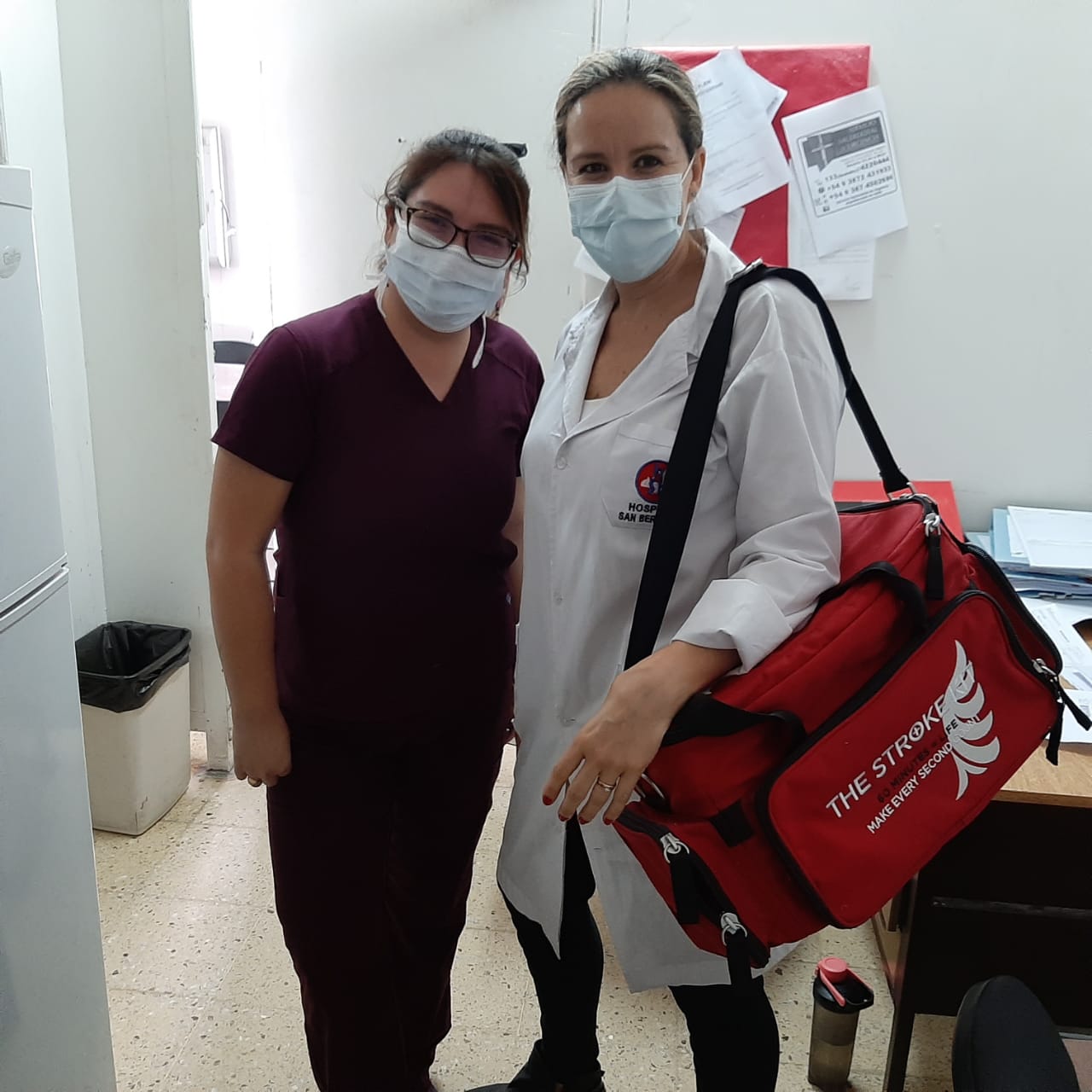
La strada per tornare a Salta
All’arrivo di Gabi non vi è alcun programma per l’ictus presso l’ospedale spagnolo, ma non vi è alcuna carenza di supporto per una sperimentazione sulla neurologia vascolare del secondo anno residente in grado e disposto ad affrontare le barriere all’implementazione del protocollo per l’ictus. Con un team di medici e la collega Dott.ssa Brenda Borrego Gerrero nel suo angolo, l’ospedale spagnolo trombolizza la sua prima paziente con ictus due anni dopo, ma non è ancora il momento di tornare a Salta.
Gabi è accettato in una borsa di studio presso l'ospedale italiano di Buenos Aires, la casa clinica di uno dei neurologi più stimati dell'Argentina, la Dott.ssa Maria Cristina Zurrú. Seguono anni di intenso apprendimento, ma Salta continua a chiamare, e nel 2013 la Dott.ssa Gabriela Orzuza torna a casa per il motivo per cui è andata a prendere il farmaco dello studio, per prendersi cura dei pazienti dell’ospedale San Bernardo mentre aveva guardato suo patrigno.
A questo punto non c’è posto libero per un neurologo a San Bernardo. Tuttavia, non c’è anche alcun personale della stroke unit, nessun piano per l’ictus e nessun trattamento per lictus, quindi il Dottor Orzuza firma comunque e lavora gratuitamente. Dopo un anno le è permesso di avere successo all’istruttore dipartimentale dei residenti in neurologia in un contratto temporaneo per il quale dovrà riapplicarsi ogni quattro anni.
Gabi ha incontrato il marito Roque Gutiérrez nel suo primo mese di vita a Salta e mancano settimane alla nascita del primo figlio quando la prima paziente viene sottoposta a trombolisi presso l’Ospedale San Bernardo nel 2015. Il paziente arriva il sabato. Gabi ricorda che c’è stata una scramblea per sbloccare la farmacia dove è stato conservato il trombolitico...
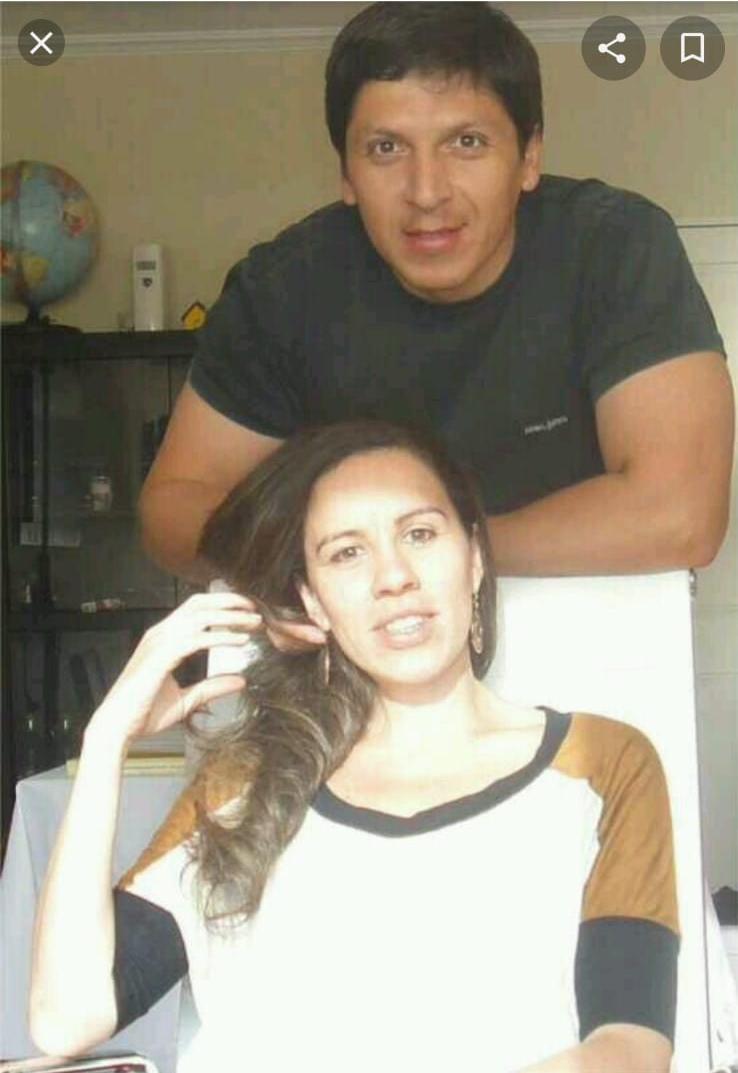
Riga la barca
Entro il 2018, il dott. Orzuza conosceva molto bene il percorso verso la farmacia. San Bernardo rientra nella categoria degli ospedali autogestiti che ricevono finanziamenti pubblici ma hanno autonomia sul modo in cui vengono utilizzati i fondi. Tuttavia, lictus è rimasto una priorità bassa; non c’era ancora alcuna stroke unit, nessun letto esclusivamente per i pazienti colpiti da ictus e doveva riapplicare il contratto per rinnovare il contratto.
"Abbiamo un'espressione in Argentina – 'come remare in dulce de leche'", dice, si riferisce a un famoso dessert di caramello denso. I progressi hanno sentito che lento, e la Dott.ssa Orzuza si sentiva "davvero sola".
Entra in Alejandro Rossi, che dopo oltre due decenni con Boehringer Ingelheim era ora consulente Consulente Angels. Ascoltare l’Iniziativa Angels ha prodotto un senso di enorme sollievo, afferma la Dott.ssa Orzuza. "Alejandro ha detto: "Gabi, ho quello che mi ha chiesto." Era il carburante di cui avevo bisogno per continuare."
Gabi e Alejandro hanno dato il via alla loro collaborazione iscrivendo 160 infermieri alla formazione. Poiché gli infermieri in Argentina non sono addestrati agli stessi standard accademici di quelli in Europa o negli Stati Uniti, Gabi era preoccupato che avrebbero lottato con il materiale dell'Accademia Angels. "Ero spaventata dal fatto che avrebbero avuto paura", dice. Per affrontare queste paure, una serie di workshop di formazione si è svolta il sabato e, con la crescita delle competenze, i tempi di trattamento si sono ridotti.
Il tempo tra l’arrivo in ospedale e l’inizio della trombolisi è diminuito da 70 a 60 e quindi a 40. Alla classe finale, i pazienti colpiti da ictus a San Bernardo erano sottoposti a trombolisi entro 20 minuti dall’arrivo.
La dott.ssa Orzuza ha annotato questi numeri nei suoi fogli di calcolo come aveva sempre fatto, ma nel 2021 Alejandro ha suggerito di registrare i dati sul trattamento in RES-Q e di mettere il suo ospedale in linea con un Premio Angels, era esitante. Il suo lavoro era quello di prendersi cura dei pazienti, non vincere premi, ma Alejandro era persuasiva e i suoi residenti erano disposti ad aiutare con l’inserimento dei dati. E quando è stato confermato che l'Ospedale San Bernardo soddisfaceva i criteri per un gold riconoscimenti, la dott.ssa Orzuza ha avuto l'opportunità di utilizzare il riconoscimenti a beneficio dei suoi pazienti.
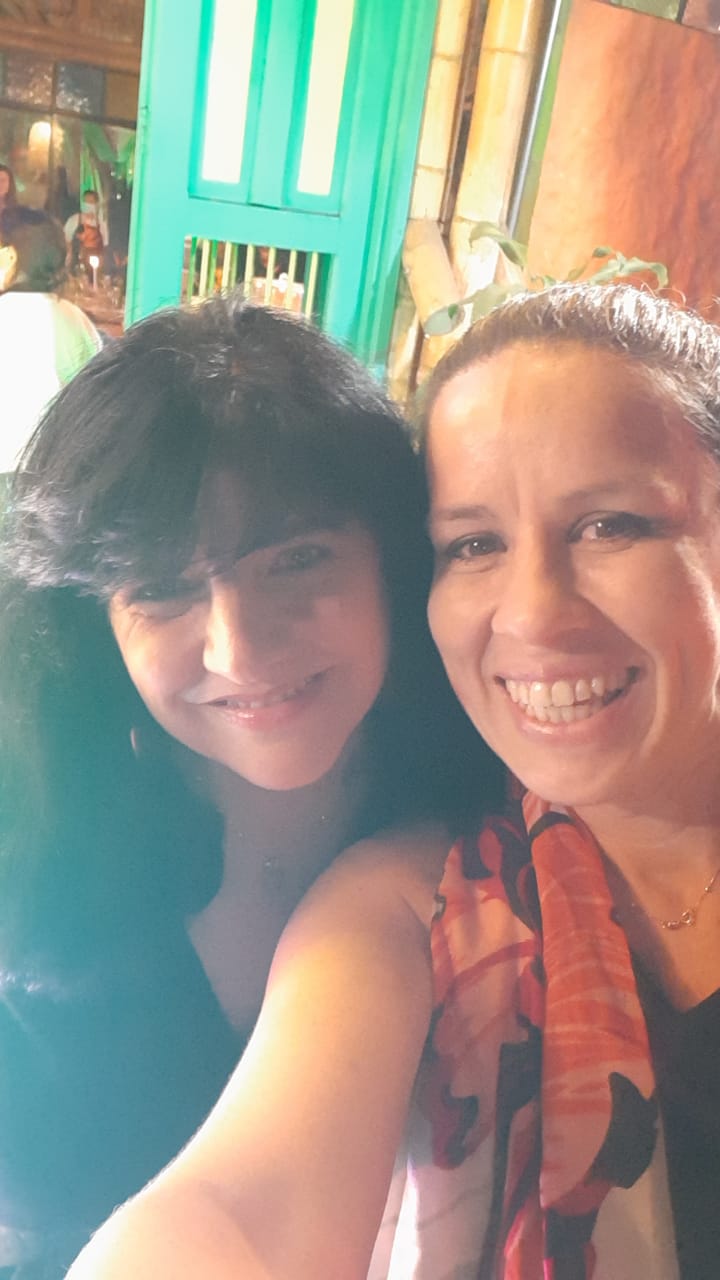
Era l’ora dello spettacolo
Le notizie del riconoscimenti si sono diffuse tramite TV, radio e notizie locali e il ministro della salute il dott. Juan José Esteban ha parlato dell’importanza della la cura dell'ictus. Un mese dopo, la dott.ssa Orzuza è stata formalmente nominata per il lavoro che svolgeva da quasi un decennio e quando nel prossimo trimestre San Bernardo ha vinto un riconoscimenti a base di platino ha utilizzato lo slancio per ottenere l’approvazione per una stroke unit.
"C'era una minuscola stanza che era stata utilizzata per il Covid ed era ora libera. Ho messo i miei due lettini e i miei infermieri. Era il mio bambino".
Il bambino ha avuto uno scatto di crescita dopo che la dott.ssa Orzuza ha partecipato a una Accademia Angels in Colombia e ha incontrato il suo idol, presidente eletto WSO Sheila Martins. Il Prof. Martins era a capo di una campagna di certificazione WSO per le ictus unit in America Latina e voleva che San Bernardo fosse presente.
"Non ho molte cose", ha affermato la Dott.ssa Orzuza.
"Si può farlo", ha detto la Prof.ssa Martins, e lei potrebbe.
La riorganizzazione dell'ospedale ha liberato il personale infermieristica dedicato necessario per la certificazione; la cardiologia le ha dato un elettrocardiografo, il pronto soccorso ha scoperto che poteva risparmiare un monitor, un altro reparto ha donato un letto.
Nel luglio 2022, il Prof. Martin ha celebrato la certificazione di San Bernardo con un post su Facebook che recitava: "Impressivo, ciò che si può fare con poche risorse ma con grande determinazione, resilienza e amore, coronato dalle lacrime emotive di una missione compiuta! Parabéns, Gabriela Orzuza".
Un mese dopo, Gabi è stato invitato a parlare del suo programma presso la Global ictus Alliance di San Paolo.
"Non ho un programma", ha detto al Prof. Martins.
"Naturalmente hai", ha affermato il Prof. Martins. "Hai lavorato sodo, questo è il tuo programma."
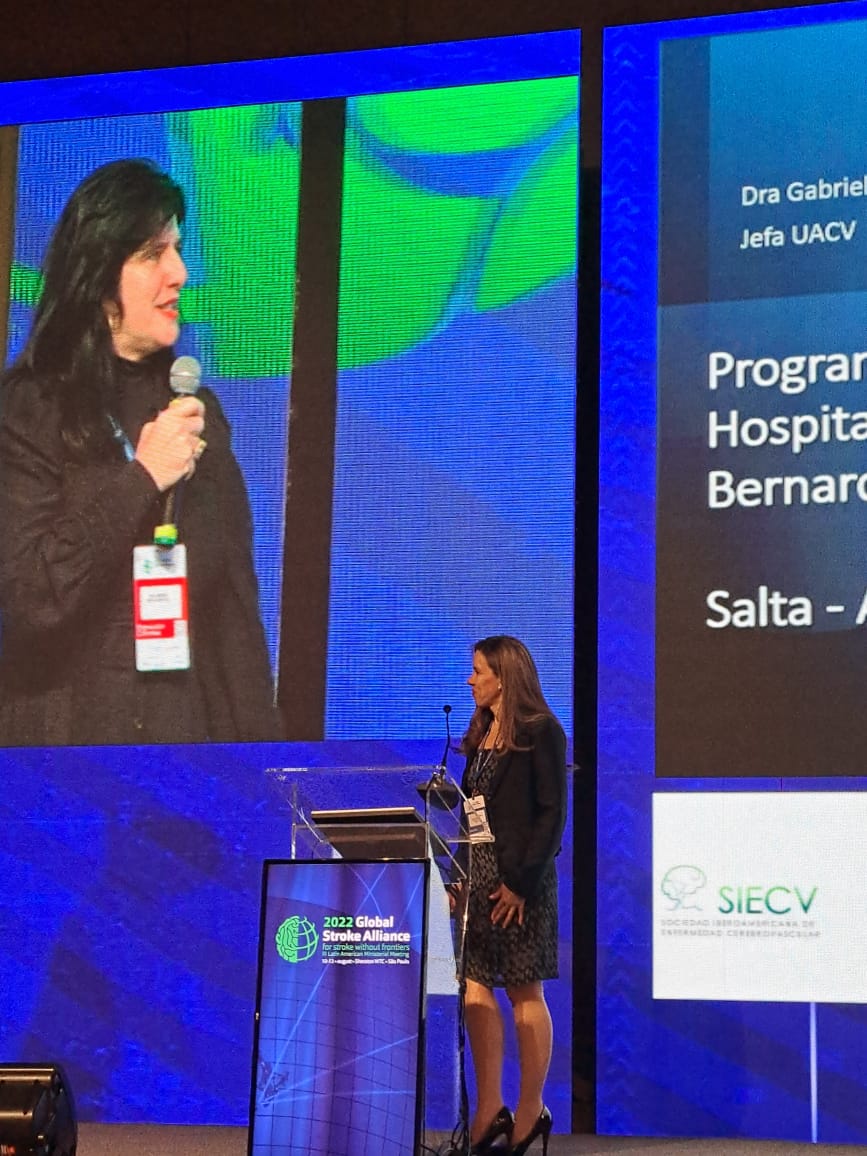
Ma la certificazione ha portato anche maggiori ricompense. L’ospedale San Bernardo ora dispone di un servizio di trombectomia e Gabi sta collaborando con Alejandro per implementare una rete di teleictus in ospedali al di fuori di Salta.
Quando parecchi anni fa ha informato una collega della sua visione di una rete per l'ictus per la provincia di Salta, in modo che i pazienti provenienti da aree remote potessero essere portati in capitale per il trattamento in elicottero, le è stato detto "Gabi, sei nato nel Paese sbagliato".
"L'ho presa come ispirazione", dice. "Lo farò qui."
Per tutta la sua determinazione, ottenere ospedali più piccoli nella regione per iniziare il trattamento dell’ictus è stata una battaglia in salita. "È frustrante", dice. "I team di questi ospedali hanno molta paura di fare qualcosa di nuovo, non vogliono lavorare con i trombolitici."
Come sempre, tuttavia, il dottor Orzuza ha trovato un modo. I residenti in neurologia sotto la sua ala condividono inevitabilmente la sua dedizione all’ictus e, mentre completano la loro specializzazione e ricoprono posizioni altrove nella provincia, portano con sé tale conoscenza ed entusiasmo.
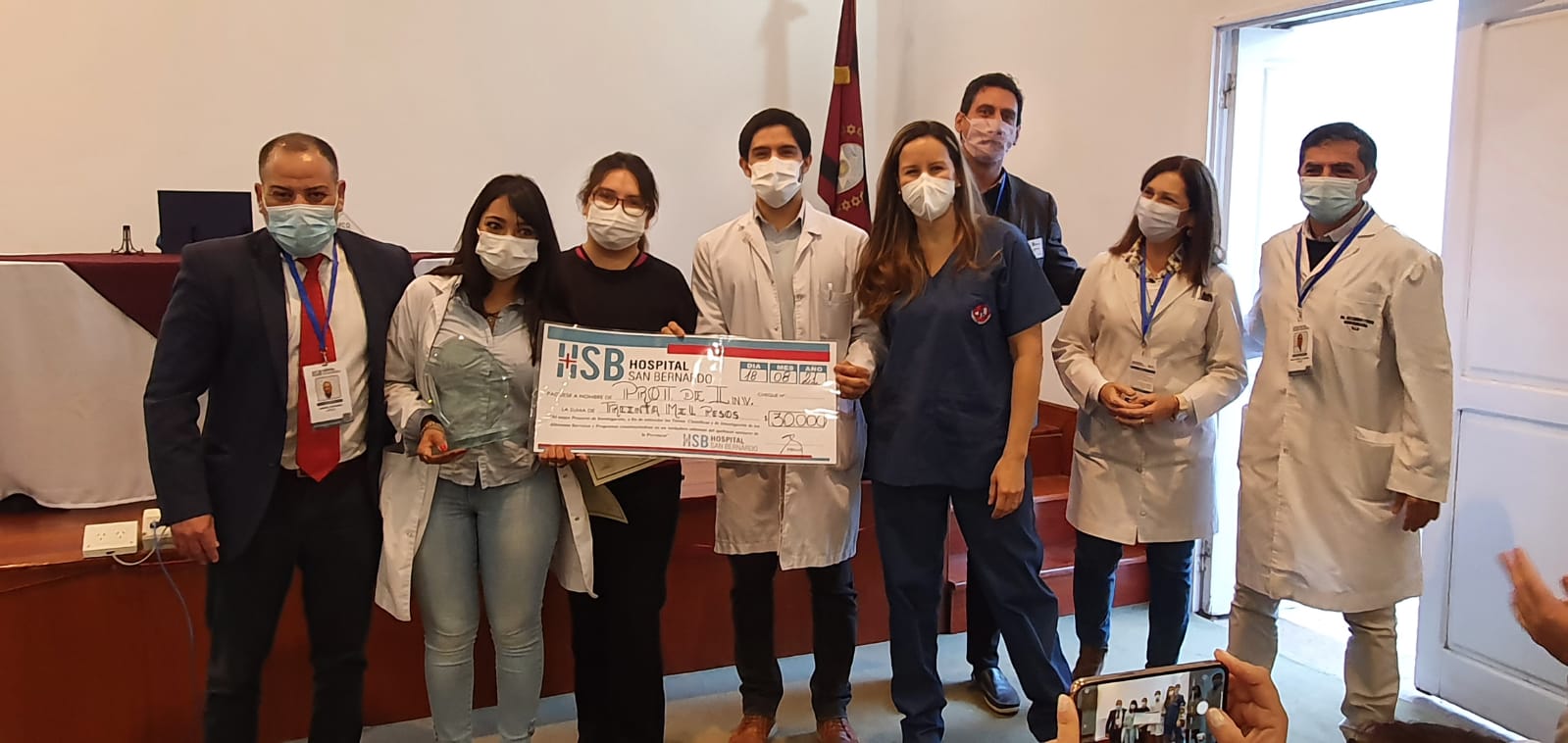
Un terzo riconoscimenti
Il 2021 è stato un grande anno per la Dott.ssa Gabriela Orzuza, ma due premi non raccontano ancora la anamnesi completa. Nell'ambito della celebrazione del 61° anniversario dell'ospedale, il primo riconoscimenti annuale alla ricerca San Bernardo è andato a uno studio sul deterioramento cognitivo dei pazienti post-ictus Chagasic condotto dalla Dott.ssa Orzuza e da quattro dei suoi colleghi.
Sebbene l'argomento necessiti di ulteriori indagini, il Dottor Orzuza afferma che la domanda relativa agli esiti cognitivi sfavorevoli osservata nei pazienti colpiti da ictus con malattia di Chagas potrebbe non avere una risposta clinica ma piuttosto trovarsi in una "differenza di opportunità".
"Disuguaglianza", chiarisce.
I pazienti con Chagas provengono generalmente da aree rurali estremamente povere, dove non hanno l’opportunità di accumulare una riserva cognitiva attraverso attività stimolanti come leggere, imparare nuove lingue o giocare a uno strumento.
Ulteriori indagini richiederanno monitor Holter in grado di rilevare le condizioni cardiache per cui un ECG tradizionale non è in grado di fornire informazioni sufficienti. La pubblicità che partecipa al riconoscimenti di ricerca rende l’acquisizione di questa apparecchiatura una certezza.
Un'altra cosa di cui potete essere certi è che, in un certo senso, la amata Dott.ssa Federico Núñez Burgos di Salta sta brillettendo con orgoglio.
